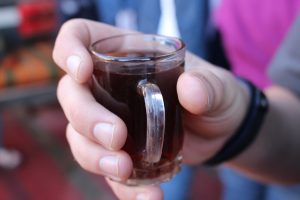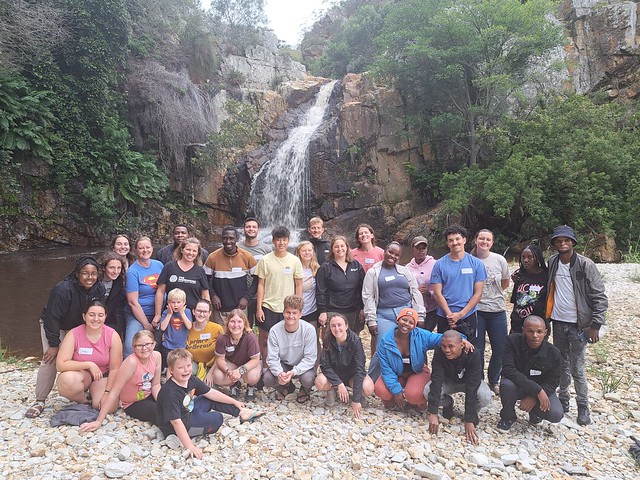Free Travel Reflections
This week was our free travel week- our big group split into several smaller ones, traveling to various different places. I was a part of a group of five that went to Greece! We left very early Monday morning, drove to the airport and were in Athens by Monday morning.
We had a few big things we wanted to do and see, but no strict itinerary so that we could just explore freely. We visited the Acropolis and saw many ancient ruins there as well as scattered throughout the city. We got a chance to explore some beautiful neighborhoods at the base of the Acropolis, all with beautiful colors and plants, hidden in tiny winding alleyways. One of my favorite parts of the trip was visiting the Athens National Garden. There were beautiful flowers and trees everywhere, as well as a lot of ducks, turtles, and other wildlife.
It was wonderful to see the sights in Athens, but we also had a lot of fun exploring, relaxing, and seeing new things. Some fond memories were made navigating through the public transportation system every day, riding buses and trains to go everywhere. These bus rides gave us the opportunity to read signs and try and teach ourselves the Greek alphabet. Although we did eat out, we also made a lot of meals which gave us the opportunity to visit grocery stores, which is one of my favorite ways to be exposed to new cultures. We also just spent many hours sitting on the beach, sifting through rocks, pocketing our favorite ones or sorting them by color. A lot of joy came from little things like these.
Overall, the trip was a wonderful excursion, filled with a good amount of both adventure and rest!
–Iris A.
Free travel this past week was amazing. It had its ups and down as expected, but was so much more than I had thought it would be! Kristina, Greta, Afton and I, all traveled to Jordan for a few days. Our first day was spent traveling from Beit Sahour to Wadi Rum where we met with our guide that took us on a desert tour and showed us all the beautiful landmarks in the area. We walked through canyons, drove down sand dunes, tried learning stick shift and drank SO much tea! That night after we got to our camp we went star gazing with our guide and one of their friends.  We sat around a fire, drank more tea, and shared riddles. Being in such a relaxed environment made it so easy to talk to the locals and get to know them, their culture, and general way of life. They live so differently than we do back in the US but yet there are so many similarities between us. I really enjoyed looking up at the stars and knowing that I would see the same ones when I got back home. The next 2 days were spent in Petra where we saw the ruins and made new friends (all animals). We spent a good amount of our time in Petra resting which was the best thing we could have done. After going through the checkpoint getting back into Israel we were all exhausted and shocked by how dehumanizing the experience was. Even though we were such a large group and went through faster than everyone else, it was monotonous and overwhelming. I am grateful for my American passport because it made my life 1,000 times easier than those with Palestinian identification, but my heart goes out to them all that much more. With every wonderful experience I have here in the Middle East, I am struck by the reminder of my privilege. It’s not easy, but if there is anything I have learned so far it is that knowledge is power, knowledge fights injustice, and we should all demand knowledge.
We sat around a fire, drank more tea, and shared riddles. Being in such a relaxed environment made it so easy to talk to the locals and get to know them, their culture, and general way of life. They live so differently than we do back in the US but yet there are so many similarities between us. I really enjoyed looking up at the stars and knowing that I would see the same ones when I got back home. The next 2 days were spent in Petra where we saw the ruins and made new friends (all animals). We spent a good amount of our time in Petra resting which was the best thing we could have done. After going through the checkpoint getting back into Israel we were all exhausted and shocked by how dehumanizing the experience was. Even though we were such a large group and went through faster than everyone else, it was monotonous and overwhelming. I am grateful for my American passport because it made my life 1,000 times easier than those with Palestinian identification, but my heart goes out to them all that much more. With every wonderful experience I have here in the Middle East, I am struck by the reminder of my privilege. It’s not easy, but if there is anything I have learned so far it is that knowledge is power, knowledge fights injustice, and we should all demand knowledge.
–Savannah S.
Digging Deeper
Our fifth week of the Middle East Intercultural offered an opportunity for free travel – a chance to “explore” countries and communities surrounding Palestine. Dreading the prospect of another plane ride and the nerves that come with leaving and re-entering Israel, I decided to stay put in our guest house in Beit Sahour. I was craving the chance to dig deeper into this place I’ve come to know as home over the past four weeks. At the end of our first week in Palestine, we traveled as a group to Jerusalem. The experience was jarring and unsettling as many of us struggled to reconcile the reality of being in the Holy Land while witnessing constant military presence at sacred sites. So when I had the opportunity to return, at a slower pace with a smaller group, I was ecstatic. My second trip to Jerusalem was difficult for the same reasons but also offered me many joyful experiences – experiences like getting tattoos with friends that had been designed centuries ago. After four weeks, our Arabic was significantly better as well (at least our confidence in it was) which was an easy bridge to new friendships in parts of the old city. I held a lot of gratitude for that do-over trip and a week of spaciousness.
–Jessica C.






















